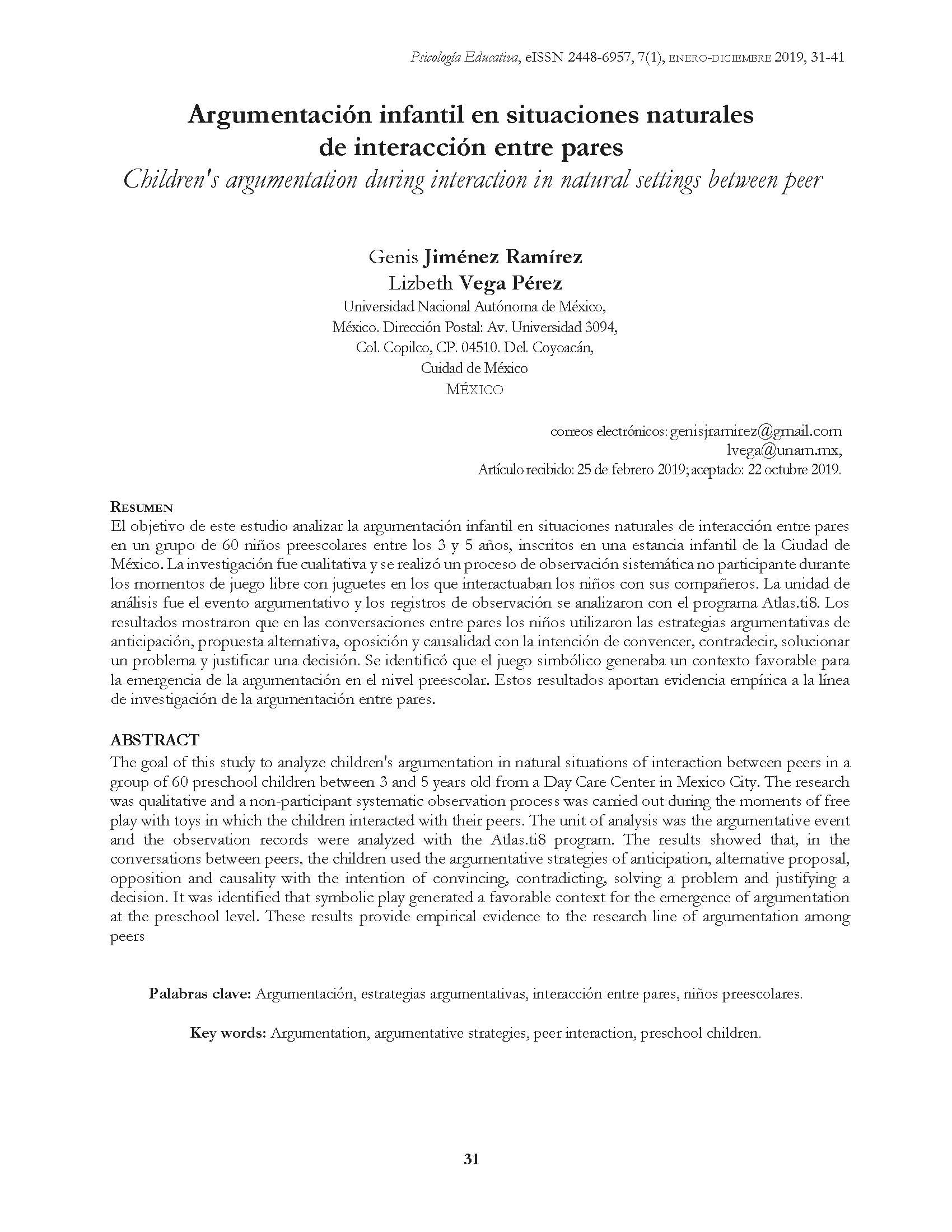Abstract
The goal of this study to analyze children's argumentation in natural situations of interaction between peers in a group of 60 preschool children between 3 and 5 years old from a Day Care Center in Mexico City. The research was qualitative and a non-participant systematic observation process was carried out during the moments of free play with toys in which the children interacted with their peers. The unit of analysis was the argumentative event and the observation records were analyzed with the Atlas.ti8 program. The results showed that, in the conversations between peers, the children used the argumentative strategies of anticipation, alternative proposal, opposition and causality with the intention of convincing, contradicting, solving a problem and justifying a decision. It was identified that symbolic play generated a favorable context for the emergence of argumentation at the preschool level. These results provide empirical evidence to the research line of argumentation among peers
References
Banks-Leite, L. (1997). La argumentación en el niño de edad preescolar. Revista Colombiana de Psicología, 5(6), 91-95. doi: 10.15446/rcp
Dovingo, F. (2016). Argumentation in preschool: a common ground for collaborative learning in early childhood. European Early Childhood Education Research Journal, 24(6), 818-840, doi: 10.1080/1350293X.2016.1239327
Eisenberg, A. R. (1987). Learning to Argue with Parents and Peers. Argumentation, 1(2), 113-125. doi: 10.1007/BF00182256
Felton, M. K. (2007). La discussió deliberativa: usar el discurs de classe per promoure el pensament crític. Revistes Temps d’Educatió, 33, 183-202. https://www.raco.cat/index.php/TempsEducacio/article/view/126489
González, J. (2014). El proceso de argumentación en el inicio escritor. Acta Universitaria, 24(5), 33-46. doi: 10.15174.au.2014.633
Jiménez, L. y Muñoz, M. (2012). Educar en creatividad: un programa formativo para maestros de Educación Infantil basado en el juego libre. Electronic Journal of Research in Educational Psychology, 10 (3), 1696-2095. Recuperado de http://dialnet.unirioja.es/
Jiménez, G. & Vega, L. (2018). Estrategias argumentativas en situaciones naturales de interacción en aulas de nivel preescolar. Actualidades en Psicología, 32(125), 113-131. https://doi.org/10.15517/ap.v32i125.31976
Jiménez, G. Y. (2019). Estrategias argumentativas en situaciones naturales de interacción en aulas de nivel preescolar. [Tesis Doctoral, Universidad Nacional Autónoma de México].
Köymen, B., Rosenbaum, L., & Tomasello, M. (2014). Reasoning during joint decision-making by preschool peers. Cognitive Development, 32, 74–85.
Kuo, M. (2011). Children in arguments with peers: Young children’s strategies as Opposer and Opposee. Proceedings of the 23rd North American Conference on Chinese Linguistics, 23(2), 123-132. Recuperado de https://naccl.osu.edu/sites/naccl.osu.edu/files/ NACCL-23_2_09.pdf
Kuhn, D., Hemberger, L., & Khait, V. (2016). Dialogic argumentation as a bridge to argumentative thinking and writing. Infancia y Aprendizaje, 39(1), 25-48. doi: 10.1080/02103702.2015.1111608
Larraín, A., Freire, P., & Olivos, T. (2014). Habilidades de argumentación escrita: Una propuesta de medición para estudiantes de quinto básico. Psicoperspectivas. Individuo y Sociedad, 13(1), 94-107.
Macedo, A. P. (2011). The Development of Children’s Argument Skills (Thesis doctoral). University of London, London. Recuperado de https://core.ac.uk/download/pdf/28897840.pdf
Martí, E. (1978). Estudio del Pensamiento analógico en el niño de 2 a 8 años: Metáforas y comparaciones espontáneas. Anuario de psicología, 19, 39-56. Recuperado de: raco.cat/index. php/AnuarioPsicologia/article/view/64452/88133
Mercer, N. (2011). Reasoning serves argumentation in childrens. Cognitive Development, 26(3), 177- 191. doi: 10.1016/j.cogdev.2010.12.001
Migdalek, M. J., & Rosemberg, C. R. (2013). Construcción multimodal de los argumentos de niños pequeños en disputas durante situaciones de juego. Papeles de trabajo sobre Cultura, Educación y Desarrollo humano, 9(4), 1-16. Recuperado de: https://www.uam.es/otros/ptcedh/2013v9_ pdf/v9n4esp.pdf
Migdalek, M. J., Santíbañez, S., & Rosemberg, C. R. (2014a). Estrategias argumentativas en niños pequeños: Un estudio a partir de las disputas durante el juego en contextos escolares. Revista Signos, 47(86), 435-462. doi: 10.4067/S0718-09342014000300005
Muller, N., Perret-Clermont, A. N., Tartas, V., & Iannaccone, A. (2009). Psychosocial Processes in Argumentation. En: N. Muller & A. Perret-Clermont (Eds.), Argumentation and education (pp. 67-90). New York: Springer.
National Association for the Education of Young Children. (2011). Código de conducta ética y declaración de compromiso. Estados Unidos: Autor. Recuperado de http://www. psicologia.unam.mx/documentos/pdf/comite_etica/NAEYC_Ethics_Spanish_ Position_Statement2011_09202013.pdf
Rodríguez, S., Lorenzo, O., & Herrera. L. (2005). Teoría y práctica del análisis de datos cualitativos. Proceso general y criterios de calidad. Revista Internacional de Ciencias Sociales y Humanidades, 15(2), 133-154. Recuperado de http://www.redalyc.org/ pdf/654/65415209.pdf
Rapanta, C., García-Mila, M., & Gilabert, S. (2013). What is Meant by Argumentative Competence? An Integrative review of Methods of Analysis and Assessment in Education. Review of Educational Research, 83(4), 483-520
Rogoff, B. (1991). Apprenticeship in thinking. Cognitive development in Social Context. Oxford University Press: USA.
Ruiz, J. L. (1996). Metodología de la investigación cualitativa. Bilbao: Universidad de Deusto.
Rytel, J. (2014). The nature and development of argumentative skills in children: Current research. RES Rethorica, 1(1), 15-26.
Secretaría de Educación Pública. (2011). Programa de estudio 2011, guía para la educadora: Educación Básica Preescolar. México: Autor. Recuperado de http://www.reformapreescolar.sep.gob.mx/actualizacion/programa/Preescolar2011.pdf
Sociedad Mexicana de Psicología. (2009). Código ético del psicólogo. México D. F., México: Trillas.
Stein, N., & Albro, E. R. (2001). The origins and nature of arguments: Studies in conflict understanding, emotion, and negotiation. DiscourseProcesses, 32(2–3), 113–133.
Stein, A., & Migdalek, M. J. (2017). La construcción del “mundo de ficción” y de la trama narrativa en situaciones de juego simbólico en el hogar. Actualidades en Psicología, 31(122), 1-15. doi: 10.15517/ap.v31i122.22707
Vigotsky, L. S. (2009). Pensamiento y lenguaje. [Trabajo original publicado 1934]. México D. F., México: Ediciones Quinto Sol.
Wolfe, S., & Alexander, R. J. (2008). Argumentation and dialogic teaching: alternative pedagogies for a changing world. Beyond Current Horizons, 1-18. Recuperado de https://www.robinalexander.org.uk/wpcontent/uploads/2012/05/wolfealexander.pdf
Zadunaisky, E. S., & Blum-Kulka, S. (2010). Peer talk as a ‘double opportunity space’: The case of argumentative discourse. Discourse in Society, 21(2), 211–233. doi: 10.1177/095792650935384

This work is licensed under a Creative Commons Attribution-NonCommercial-NoDerivatives 4.0 International License.
Copyright (c) 2024 Universidad Nacional Autónoma de México


